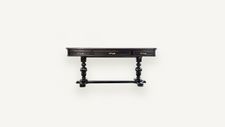
On Equal Terms
The wooden desk is painted black. Its legs are turned, its drawers opened by handles of finely worked wrought iron. The keys in the locks have richly decorated grips.
This impressive piece of furniture from the first half of the 20th century could easily have belonged to a businessman or banker, but this was not the case. In its day, it stood in Cologne-Bickendorf in the private home of Hans Böckler, first head of the Federation of German Trade Unions from 1949 onwards, and is a reflection of his power and influence.
Like many other political officials, Böckler wanted to use the new beginning after 1945 to implement a socially oriented economic system. He demanded that unions be given more influence in companies. Another long-serving unionist was Karl Arnold, who was elected North Rhine-Westphalia’s first Minister-President in 1947. As election posters from that year claim, he, too, wanted to test new and particularly social economic models.
Hans Böckler’s hour came in January 1951. Workers in the coal and steel industry of the Ruhr area were determined to go on strike when Böckler achieved his great coup. He was able to persuade Chancellor Konrad Adenauer and representatives of industry to vote for equal representation in these industries. To this day, the sector’s supervisory boards are filled in equal part by employer and employee representatives. A longstanding union dream had been achieved.